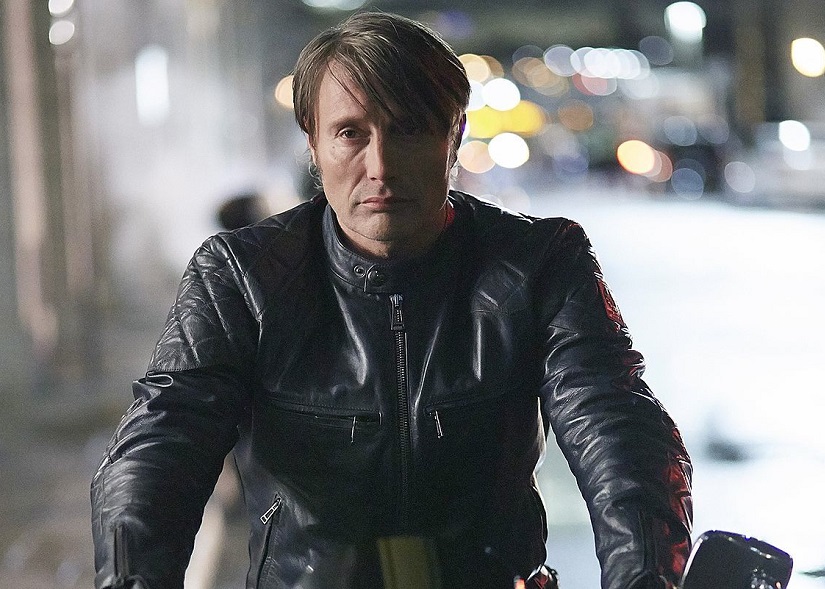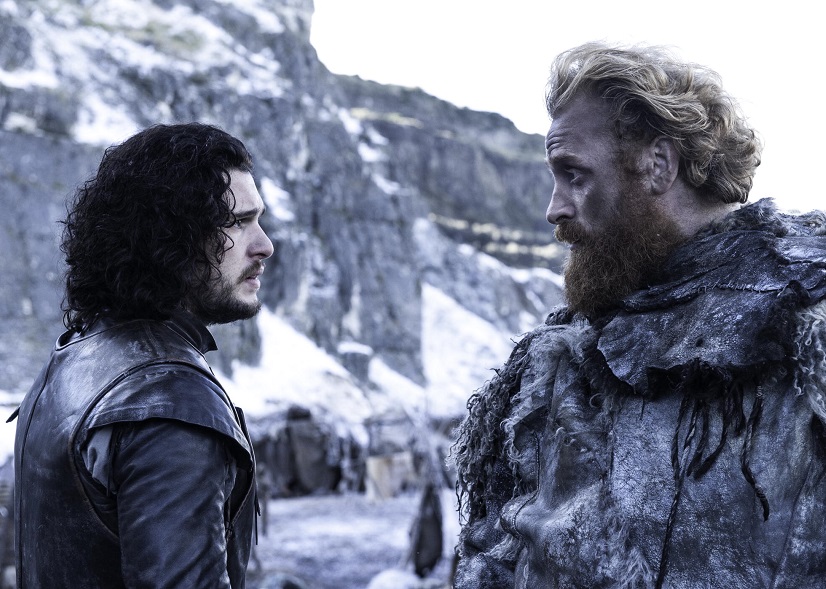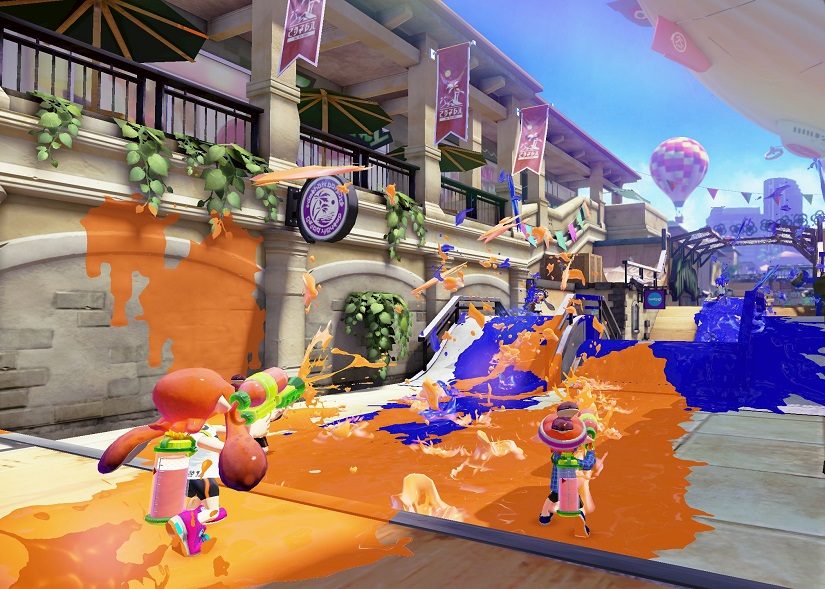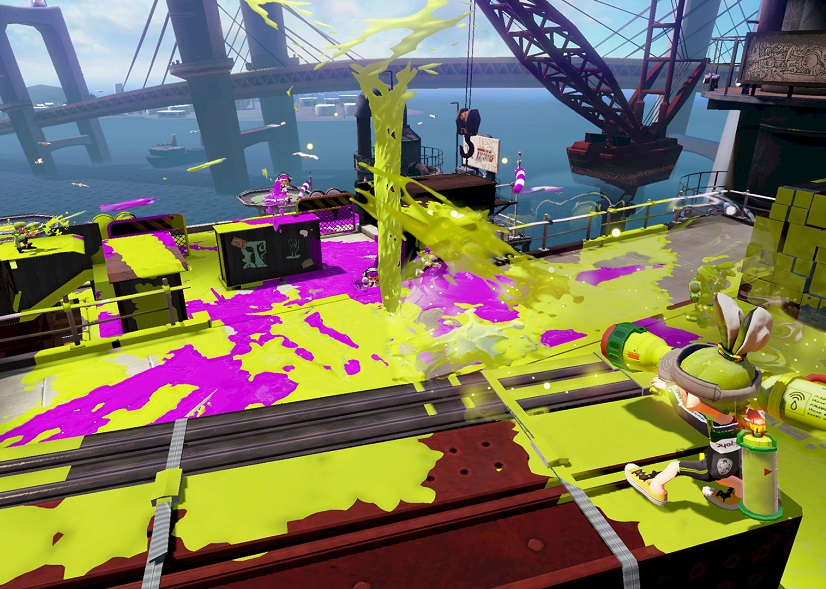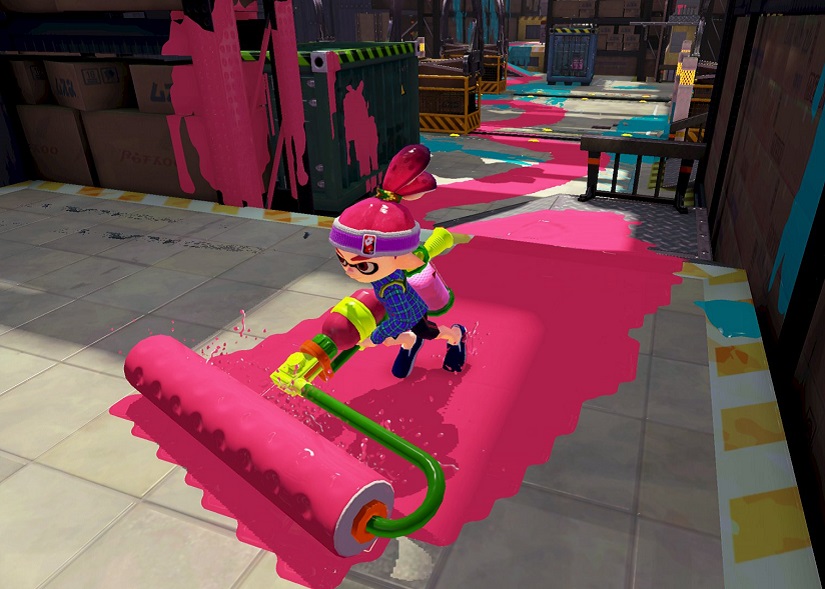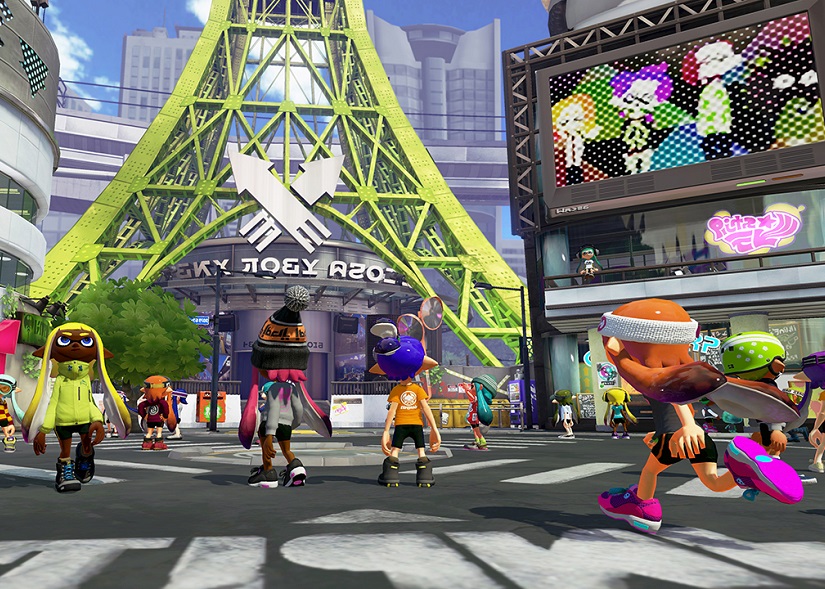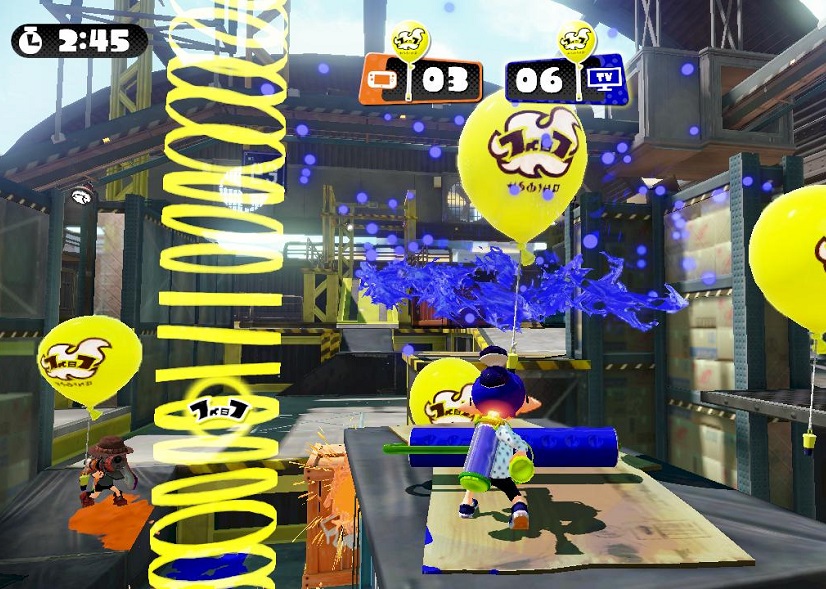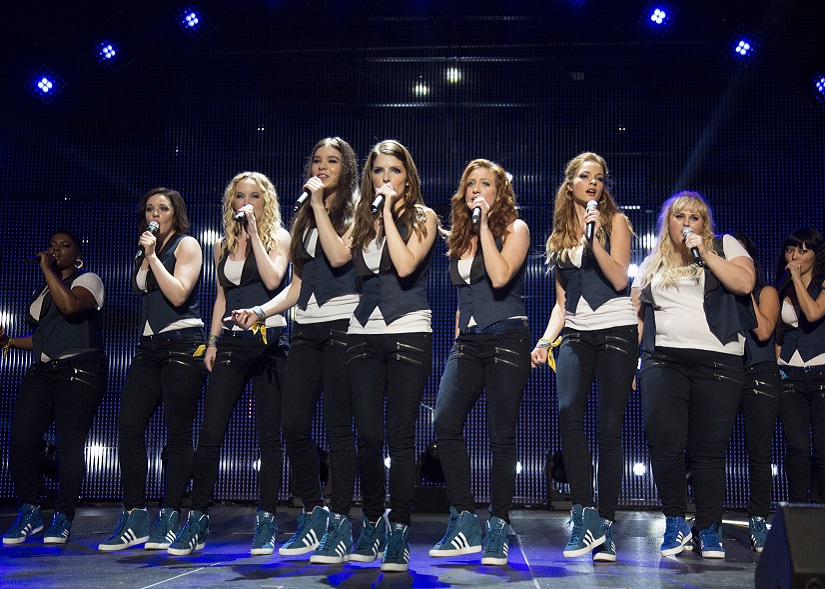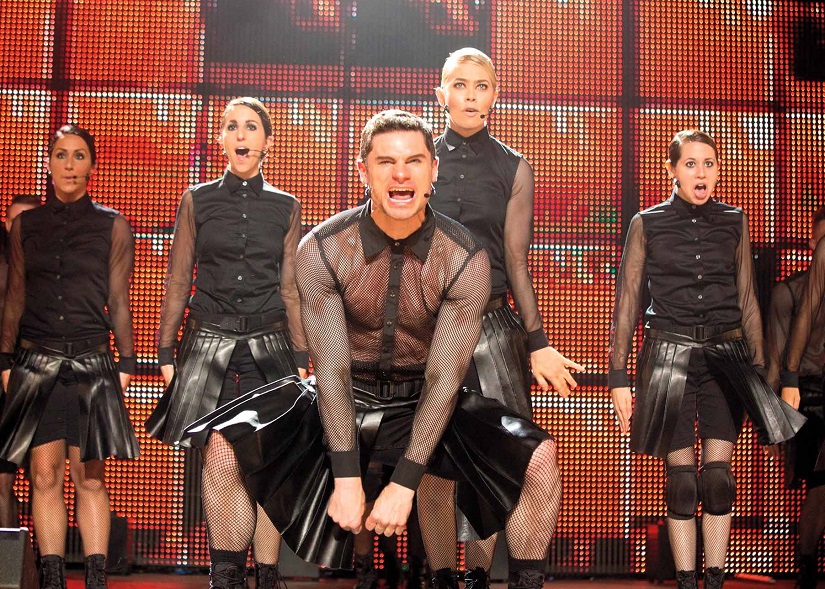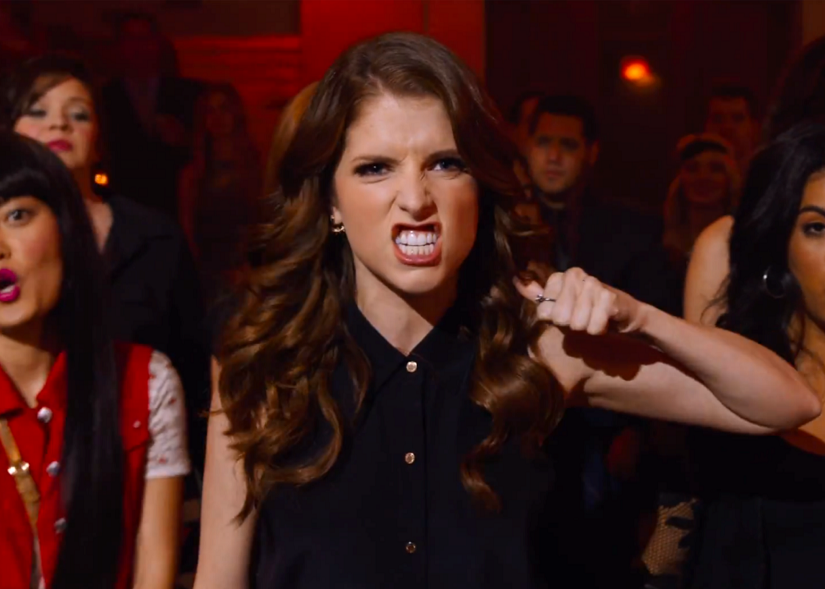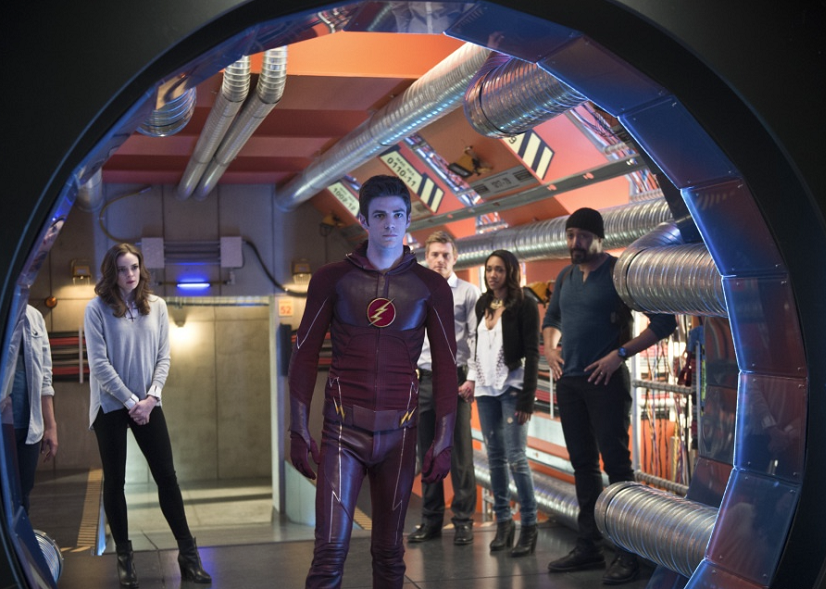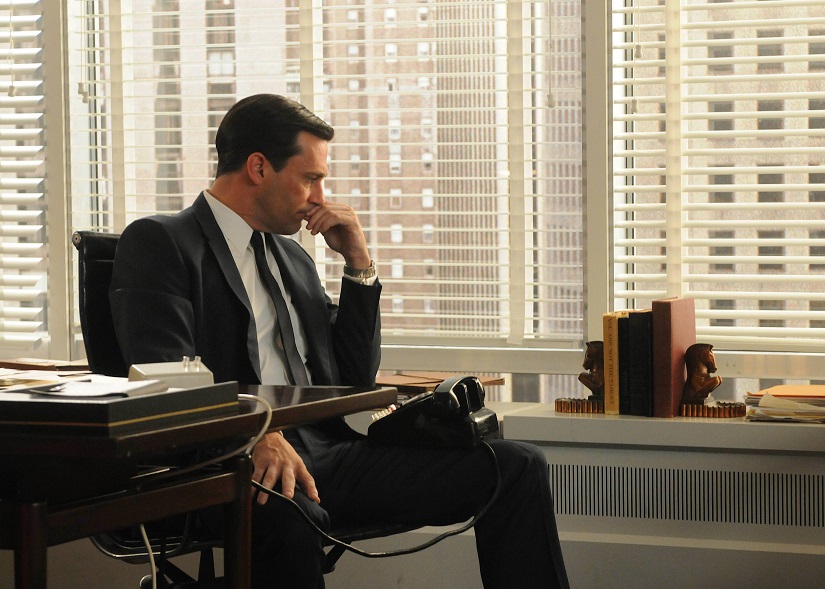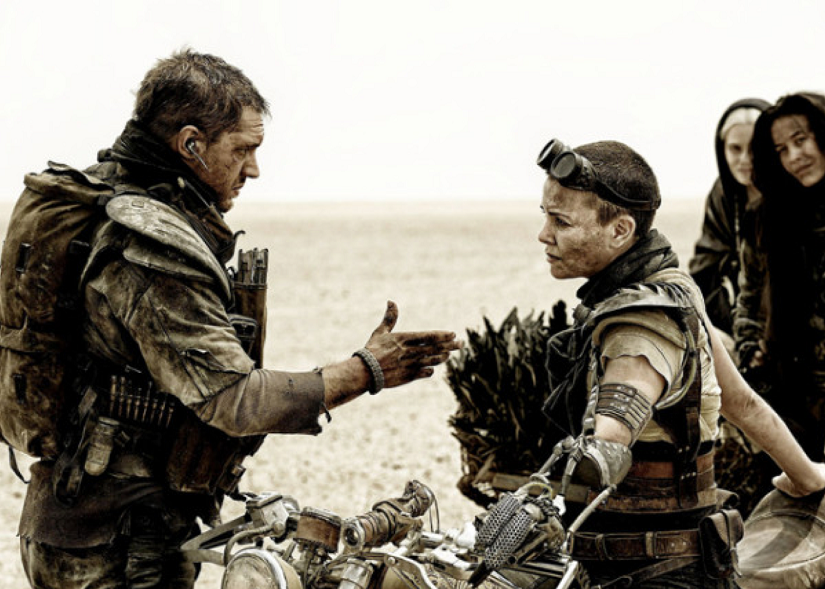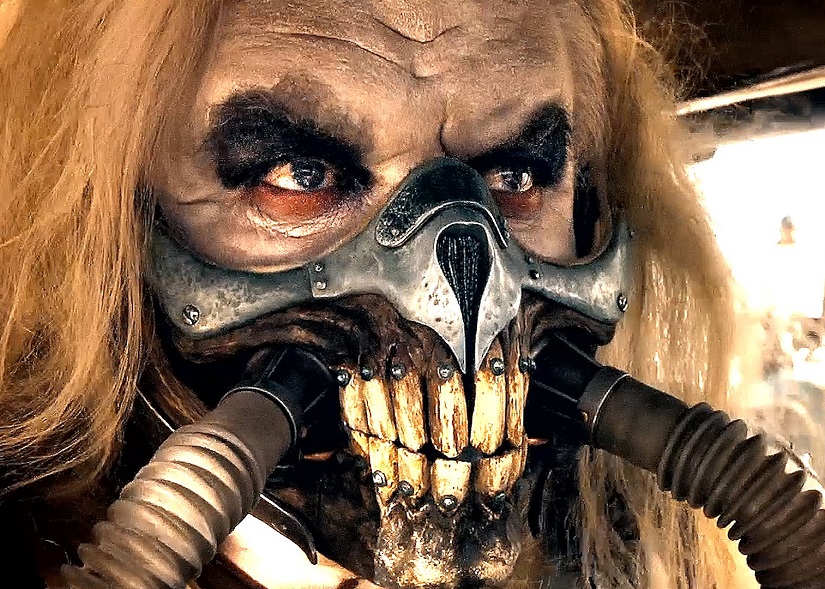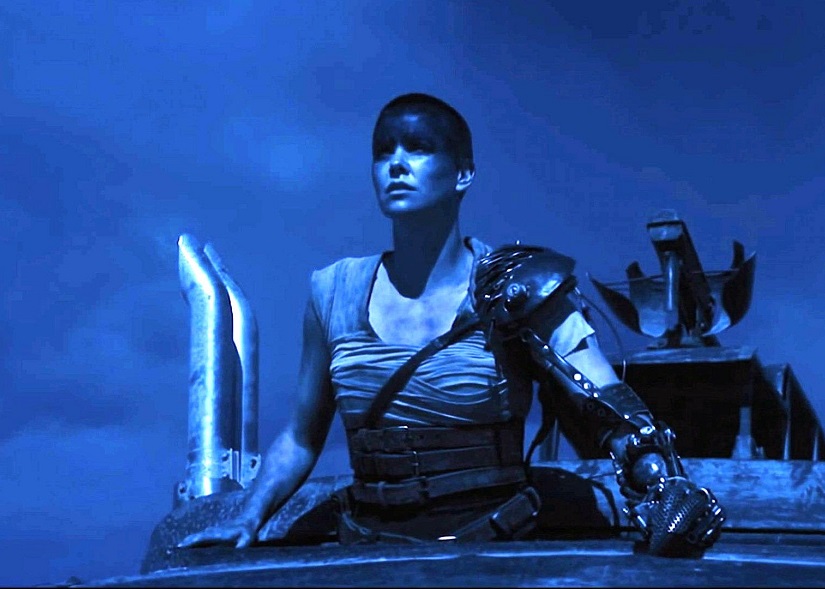[This Week In TV] Hannibal; Sense8; Community
With the TV season drawing to a close, This Week In TV is following it into a summer break. Reviewed in this final edition, Hannibal opens its third season with a gialli-inspired detour through Florentine high society, Sense8 proves that moving to Netflix has done nothing to dilute the Wachowskis' eclectic vision or ambition, and Community's first season on Yahoo comes to a close with an episode which could bow out the series for good.
[This Week In TV] Game Of Thrones; Outlander
With the TV season drawing to a close, This Week In TV is following it into a summer break. Reviewed in this penultimate edition, Game Of Thrones sees Jon Snow discover the true scale of the White Walker danger to Westeros and the Night's Watch, while Claire manages to rescue her beloved Jamie from a sadistic torturer in Outlander, but even her gifts as a healer struggle to deal with the psychological trauma he has endured.
[Review] Splatoon
The common refrain of Nintendo only making games for children may irritate fans no end, but as a statement, it is hard to argue with its accuracy. The suggestion, of course, is that no-one above a certain age would want to play their games, the patently ludicrous delusion of those still clinging to the juvenile approximation of violence with adulthood. Nintendo's games are delightful no matter how old you are, and the reason is because few other companies in the business of creating entertainment are as effortlessly capable of producing experiences which instantly recall the intense, anarchic joys of childhood.
More specifically, Nintendo remembers that such pleasures never had anything to do with the saccharine ideal often portrayed by the media through bland snapshots of toddlers laughing with their parents or playing calmy in an immaculately organised nursery. The joys of childhood were in the misbehaving, the chaos and wanton disobedience of making a mess and breaking rules you didn't even know existed. This rule-breaking has been key to Nintendo's design philosophy ever since players were encouraged to discover a warp zone in the original Mario Bros by running along the level roof. The company may have become increasingly conservative in recent years, pumping out annual Mario and Zelda titles to bolster its struggling hardware, but that core design doctrine, that mischief is always more fun than obedience, has remained, even if not quite as pronounced as it used to be.
That's where Splatoon comes in.
[youtube id="XHlgKMUePck"]
Splatoon
Developer: Nintendo
Console: Wii U
Release Date: May 29th, 2015
Shooters and territorial control games are often cited as two of the most 'hardcore' (cough) genres in gaming, demanding pinpoint precision and intricate mastery of an array of complex systems and controls. With Splatoon, Nintendo takes both genres and inverts them via a simple but inspired twist, whereby the goal is not to conquer the enemy but the arena, performed with a compact number of immediately accessible options with infinite variation. In Titanfall, EA attempted to make shooting games accessible to beginners by offering low-skilled AI opponents as cannon fodder to artificially inflate scores. Such a clunky and patronising solution ignored the real sources of the problem: unneccessarily complex controls, confusing gameplay mechanics, and intimidating levels of aggression, to name a few.
Nintendo solves it by turning the genres' most basic tenents on their heads. In Splatoon, the wisest tactical move is often to avoid the most heavily populated areas in favour of seeking out and reclaiming overlooked map real estate. As long as a player is able to navigate and hold the button to fire the ink whose coverage claims territory for their team and increases their personal score, they are able to make a positive contribution to the effort even if they don't see an opponent the entire match (as unlikely as that admittedly is). With a tap of the gamepad's touchscreen, you can at any point choose to jump to another location on the map provided an ally is nearby, providing an easy way out of sticky situations. Gunning down enemies with the game's impressively varied and well-balanced arsenal is not without benefits, though the most important is tactical, forcing a member of the four-strong opposing team out of action for a few seconds and giving your team a momentary but essential advantage during which game-winning pushes into enemy territory can be made.
Achieving significant ground coverage also aids navigation, with your player able to transform into a squid and swim at high speed through ink of his or her own team's colour, even up and over certain walls. Doing so robs you of all offensive capability, but adds a stealth element - using a well-placed ink trail to sneak up behind an enemy and splat them is a thrill discovered early and which never becomes any less gratifying - and a further tactical element to the gameplay, whereby choosing the moment to risk a charge down a precarious ink trail through enemy lines, using speed rather than power to survive, can lead to a potentially enormous advantage, especially with teammates able to immediately jump to your side should you make it.
For all that killing, or splatting, is de-emphasized, your choice of weapon can make a huge difference to your role in the game. Rapid-fire weapons offer little range or accuracy, but balance ground coverage with reasonable offensive power when pushing towards choke points. Rollers (literally giant paint rollers) can lay down a wide, continuous path of ink, essential for quick navigation and aggressive land-grabbing, but are immensely vulnerable to attack from above or at a distance. Chargers, the game's sniper rifles, are specialised high-power weapons with the greatest focus on taking out opponents, but can put together huge scores with thoughtful use. The many variations on these weapons offers a smorgasbord of in-between options for those whose skillset doesn't comfortably fit into one specific category. Overly efficient Aerospray aside, they all offset each other nicely.
In addition to your primary weapon are subs and specials. Subs are the equivalent of Call Of Duty's equipment, offering both explosive and tactical options. Specials are the game's version of killstreaks, unlocked once you have covered or reclaimed a certain amount of territory. These create some of the game's few balancing issues. While each has its purpose and can be an invaluable asset in the right hands, some subs and specials are noticeably more formidable than others: the Kraken, for instance, transforms the player into an invincible sea monster who can cut an ink trail through enemy territory and destroy all in its path. The Killer Wail sonic blast, with its cover-permeating range and wide radius, becomes insanely powerful in narrower maps.
None is game-breaking by any stretch, but Nintendo's solution, locking weapon sets to prevent players chopping and changing to the most devastating combinations, only serves to undermine the solid balance of the primary weapons by making certain sets inviable should the supporting options not be strong enough to compete. That lack of customisation is symbolic of what holds Splatoon back from making the most of the phenomenal gameplay experience at its core. Nintendo's refusal to give players the full range of options that should be a genre standard feels very much like unneccesary caution from a company with a young audience venturing on its own for the first time into a genre traditionally reserved for more advanced players. Having to quit out of online lobbies to adjust your load-out is a ridiculous frustration, especially for such a tactical game, when most online shooters allow you to not only change in-between matches, but often during them as well.
The number of clothing options available from the Inkopolis hub in which to kit out your avatars is also undermined by the associated perks being entirely randomised bar one. This is, again, presumably to prevent players stacking themselves with a small number of powerful options, but a more balanced set would prevent that more naturally. It instead encourages players to choose aesthetic options they may not like in order to take advantage of the boosts they provide. It ceases to be about players expressing themselves and more a slightly grating push to engage in a system of cynical capitalism encouraging results and function over creativity and self-representation. Achieving a high enough level allows you to re-roll your perks, but it's a costly option that continues to put players at the mercy of a random draw.
Online multiplayer is the game's overwhelming focus and runs smoothly despite suffering the occasional connection failure which also blighted Mario Kart in its post-launch months. Fair warning, there have also been reports of a small number of players struggling to connect at all. Offline, the single player mode is short and sweet, barely five hours in length and, outside the endearingly barmy boss fights, feels more like an extended training mode than campaign in and of itself. Nevertheless, it offers impressive variety in visuals and design, combining the look and obstacle course structure of Super Mario Galaxy 2 with the spraying mechanic from Super Mario Sunshine. There's little incentive to replay levels once they've been completed, but collecting the secret scrolls hidden in each reveals an enjoyably silly and surprisingly detailed lore underpinning the game's squids vs octopodes conceit.
It's a shame there isn't an arena mode to battle AI opponents in the multiplayer maps, and the local multiplayer option, while frantic enough on the smaller maps, is so stripped down (involving popping balloons rather than territory coverage, for whatever reason) that its appeal is likely to be decidedly short-term. Restricting player numbers to two is another annoyance, especially when trawling the bigger maps becomes a drag which could have been at least partially alleviated by allowing four players to enter the fray in 2v2 competition. The local multiplayer control options are also incomprehensively narrow and counter-intuitive: the player using the gamepad can only play on the tiny gamepad screen, giving the player using a Pro or Classic controller the entire TV to themselves. The lack of a splitscreen option reeks of Nintendo trying to force usage of the gamepad's features in a way that also permeates the rest of the game. Outside local multiplayer, the gamepad is the only available control option, despite none of touchscreen features requiring functions that the Wii U's Call Of Duty titles haven't already handled quite ably for non gamepad-users by allowing players to toggle transparent on-screen maps. The inability to use the Wii remote/nunchuck combo is especially jarring given what a natural fit pointer aiming would seem to be for Splatoon's rapid-fire gameplay.
If the absence of control choices and customisation is an annoying but hardly overwhelming issue, the dearth of options even in the game's online multiplayer is far more difficult to overlook. While the limited single player and local multiplayer are forgiveable and the novelty of the bold gameplay is enough to keep things fresh (to use the game's own 90s-inflected lingo) for hour after hour of play, launching with only five maps and a single mode - with one more of each unlocking tonight - in the headline online multiplayer is entirely unacceptable. That custom matches with friends reportedly won't be unlocked until August only makes the situation all the more ridiculous.
The staggered roll-out of maps and modes in free DLC can be interpreted as Nintendo giving players time to get used to the specific demands of the game, or less optimistically as a cynical bid to make players hold onto it and reduce the second-hand market. With upcoming multiplayer maps already existing in the single player mode - levels 08 and 20, if you're after a sneak-peek - it taints what is otherwise one of Nintendo's most exciting and innovative releases in years. While the game's budget price in Europe makes it worth the plunge regardless of those early shortfalls, recommending it at the full $60 price to American buyers is considerably more difficult, at least until the full complement of 14 maps has been released in a few months' time - at which point, the game might well be cheaper anyway. Splatoon is a game that demonstrates all the subversive, groundbreaking glee that marks out the very greatest of Nintendo's work. Now they just need to finish it.
[Review] Pitch Perfect 2
There's a natural sense of trepidation when a sequel comes around to a small, unheralded movie which turned into an unexpected hit, as was the case for Pitch Perfect. The original may have been a barely disguised riff on Glee, aiming to latch onto the coattails of the series' popularity, but an excellent cast, slyly sympathetic characters and a surprisingly edgy line in humour combined to form its own version of the victorious underdog story. The difficulty in producing sequels to such movies is not only that the element of surprise is gone, but the need to raise the stakes over its predecessor can often lead to the small, personal charms which gave the original its identity being overlooked.
Pitch Perfect 2 doesn't escape that curse, but the first movie's delights are strong enough that the many elements which are carried over wholesale, whilst never as funny or fresh as the first time around, nevertheless make it far from A Ca-tastrophe. What, you didn't think you were going to get through a Pitch Perfect review without some A Cappella puns, did you? I'm afraid that much is positively A Ca-demic.
OK, that'll do.
[youtube id="uC0cBktoD-Q"]
Pitch Perfect 2
Director: Elizabeth Banks
Rating: PG-13
Release Date: May 15th, 2015
Pitch Perfect 2 follows all the sequel tropes to the letter, which means that having won the Nationals, the Bellas must now move onto the World Championships, facing off against the requisite superpowered Eurotrash villains, who go by the amusingly idiotic name of Das Sound Machine (DSM) - did no-one on the writing staff know even a second word of German? The stakes are also higher, with the Bellas in danger of being suspended from collegiate competitions following a wardrobe malfunction in front of a stock-footaged President Obama. None of it makes much sense (should the Bellas care about collegiate suspension when already competing globally? The movie doesn't investigate) but while that's not much of a problem in and of itself, because no-one in their right mind sits through an A Cappella movie expecting to be riveted by plot, it is representative of a rushed, slightly underdeveloped feeling that permeates much of the movie.
The original may have been as formulaic and straightforward as it goes, but worked that simplicity to its advantage by layering pathos and fun into the surrounding details. This time around, the central plotline remains unashamedly locked to formula but is bogged down by superfluous subplots that inform character only on the most superficial level and feature little meaningful interaction with the story we're here to see. Beca trying to use an internship at a record label to put in place the building blocks of a producing career, and her fears of not being good enough, is a fine idea, but adds no extra conflict or complication, barring a small amount of rapidly dismissed angst, to the Bellas' path to global domination. The same goes for a character-undermining romance for Fat Amy, whose appeal is rooted in her free-spirited independence. Neither offers anywhere near the required number of laughs or worthwhile performances to justify the time they steal away from the main plot.
The Championships plot is itself a bit of a mess, jam-packed with montages and pacing issues which means the event itself is compressed into a tiny amount of screentime. Were it not stated beforehand, you'd only know the finals take place in Copenhagen, for instance, thanks to one establishing scene barely lasting a minute. The number of tangents and diversions the Bellas go through never feel like anything less than padding, but are at least mostly enjoyable. A pre-Championships competition at a country club owned by David Cross doesn't serve any purpose, but brings in a handful of enjoyable music numbers as a like-for-like, if less character-driven, replacement for the first movie's riff-off. The boot camp later attended by the Bellas to rediscover themselves in light of the seemingly insurmountable competition of DSM also feels more like an excuse for the cast to have a fun few weeks messing around at a forest resort, but leads to a sweet bonding scene for the girls around a bonfire and brings out an unexpectedly affecting refrain for Anna Kendrick's 'Cups' song.
The relationship between the girls is the glue which holds the movie together, this time focusing on how each of them has been changed by the friendships formed in the group, continuing a long tradition of Bellas finding strength in each other. Newcomer Emily, daughter of a former Bella (played by Katey Sagal, whose lack of screentime and singing opportunities is verging on the disgraceful) effectively takes the role of second lead and is played with great warmth by Hailee Steinfeld. With a second Pitch Perfect sequel already on the cards, it wouldn't be a surprise to see Steinfeld take over as leader of the group from Beca, played by Anna Kendrick in a performance which feels like her first phone-in. The famous awkward Kendrick charm is all there, but on auto-pilot. Whether that's down to disengagement on her part or simply weaker material remains to be seen, because Rebel Wilson too struggles to hit the same blunderbuss highs as in her first run as Amy.
The movie is amusing throughout, but not as consistently laugh out loud as its predecessor. Part of this is down to more lines falling flat, with such potentially strong running gags as Beca's inability to come up with any solid burns against the physically flawless DSM members never achieving the laughs they should. The first movie's fondness for its characters' quirks is also replaced by what at times skirts perilously close to a mean streak. There's nothing wrong with indulging in ironic stereotypical humour, as the original did with aplomb, but here it too often feels as though the movie is falling back on it due to a lack of anything wittier. Newcomer Florencia (Chrissie Fit) adopts the same line in disruptive non-sequiturs about strange foreign customs as was previously stock in trade for Lilly (Hana Mae Lee), who is subsequently given less material. John Michael Higgins and Elizabeth Banks as Christopher Guest-esque oddball commentators once again provide some of the biggest laughs, but their interactions are more locked into a repeated format (he exuberantly delivers a sexist quip, she offhandedly cuts him down for it) than was the case first time around.
Banks also moves into the director's chair, having served as executive producer first time around, and her inexperience manifests in an infuriating refusal to let the performances and visuals work for themselves. The movie's rhythm is savaged with incessant camera movement and quick cutting, somehow squeezing two especially obnoxious cuts into an early shot of the Bellas walking across the Barden University campus. It settles as the movie progresses, but remains intrusive during the big numbers and flat everywhere else. Despite these complaints, the movie's affection for its characters, a set of catchy performances and the inherently likeable silliness of a world where A Cappella cheesiness is treated with life-and-death importance - the Eurovision Song Contest gone global, and slightly less hilarious - carries it over the line even if the ride is decidedly bumpier than first time around. There's nothing as memorable as vomit angels, Beca going into an impromptu rap or getting caught short in the shower (or a line as unintentionally funny as "You know David Guetta?"), but it should prove no less easily rewatchable. Even if this second performance is noticeably less finely tuned, it hits the right notes often enough to earn a passing grade.
[This Week In TV] The Flash; Supergirl; Late Show With David Letterman
This Week in TV is a weekly feature reviewing the best, worst and most interesting episodes of television from the past seven days. The plan is to cover a wide variety of shows, but not always the same ones each week, so let us know in the comments which ones you’d particularly like to read about. This week sees Barry Allen travel back in time to save his mother in the Flash finale; our review of CBS' leaked Supergirl pilot; and David Letterman's final appearance as host of the Late Show.
[This Week In TV] Mad Men; Arrow; Wayward Pines
This Week in TV is a weekly feature reviewing the best, worst and most interesting episodes of television from the past seven days. The plan is to cover a wide variety of shows, but not always the same ones each week, so let us know in the comments which ones you’d particularly like to read about. This week sees Don Draper and Oliver Queen find themselves just in time for the Mad Men series finale and the final episode of Arrow's third season respectively, while Wayward Pines gets underway with the closest thing we're likely to get to an M. Night Shyamalan return to form.
[Review] Mad Max: Fury Road
Thirty years have passed since director George Miller's last visit to the dystopian future of his most famous creation, Mad Max. Since then, he's preoccupied himself with such family fare as two Happy Feet movies and a Babe sequel, having struggled to get this third Max sequel off the ground since 1998. Fury Road suggests the long wait left him with one hell of a madness build-up to get out of his system.
Loud, plotless and visually jaw-dropping, Fury Road is a heavy metal spiritual successor to the punk western stylings of its three predecessors. It's a comic book movie without a comic book, a cacophonous symphony which rejoices in the deceptive precision of its orchestrated hell-raising. At a time when many action directors attempt to hide the increasingly overfamiliar of their destructive set-pieces behind manic, incoherent shooting, Miller conducts his extended suites with a hand that grows ever more intricate as the turmoil intensifies, guiding his audience from note to note with absolute assurance and clarity.
[youtube id="woHTUsl66BY"]
Mad Max: Fury Road
Director: George Miller
Rating: R
Release Date: May 14th, 2015
Fury Road suits its title well: for all the anger and havoc unfolding on-screen, Miller ensures the audience always knows where they are going and where they have come from. It is not a movie which particularly embraces the idea of cause and effect, with its action beats tending to occur as short and punchy individual passages rather than piling on top of each other, but within those beats, the mechanics and geography of each scene are laid out and adhered to with the certainty required for each movement to flow effortlessly into the next, earning enough trust that any lapses are easy to fill through imagination and previously acquired information.
If I'm labouring the point, it's because Fury Road represents everything the Michael Bay-inspired modern action movie aspires to, but with all the finesse those movies so desperate need and lack. Bay himself, as the originator of his style, has a reasonable grasp of georgraphy but an inability to restrain his perpetually ejaculating camera long enough to bring the audience in on the bliss of the climax. Far worse are his imitators, who offer only empty bragaddocio before limp disappointment at the main event. Miller understands the importance of the tease and the ecstatic delight of carefully controlled rhythm. The dangers of frustrating repetition are high in a two-hour chase movie, yet Miller knows when to hold back and give his audience time to recharge and discover pleasures easily overlooked in the rush, before kicking the engine back into life and starting all over again.
It's in those secret pleasures where Fury Road is arguably at its most compelling. The vehicular carnage that makes up the bulk of the action offers giddy, head-banging highs unlike any movie in a long time, but the context provided by the subtly suggestive world building is what really makes it sing. Again like his action, Miller's dystopia is rabidly anarchic, yet built on immediately comprehensible power structures. There's no need for the movie to go into such depth on the intricacies of the quasi-religious mythology Immortan Joe (a fearsome Hugh Keays-Byrne) uses to control his war boys, yet with only a few lines of dialogue and off-hand visual suggestions, each detail makes the world more lived-in and tangible, deeping the credibility and stakes of the otherwise thin central plotline.
That's not to say there aren't missteps. Despite the movie's title, Theron's gloriously named Imperator Furiosa is its dramatic centre of gravity, reducing Max to little more than a passenger in his own movie. Furiosa is a commanding and exciting lead, helped by a mesmerisingly gladiatorial performance from Theron, but dominates the movie to such an extent that everything which doesn't involve her - Max's PTSD, for instance - feels aimless, even with her story ultimately little more than a journey from point A to B. As a character, she's complex, moral and focused, with a stated goal and means of achieving it, where Max is a mumbling wanderer who happens to land by her side to lend a hand. It's obvious whose story Miller is more interested in telling - a mooted sequel, unsurprisingly, has been named Mad Max: Furiosa - but there's some dissonance between the audience largely experiencing Furiosa's story from the point-of-view of Max, a character of such secondary presence as to sometimes feel mandated to fit the movie part into an established series.
Max is salvaged by another rich performance from Hardy, who bears no physical resemblance to Mel Gibson and whose character is tangentially connected at best. The ravages of his internal torment at the family he was unable to save play out not only in the slightly ham-fisted visions which afflict him at every turn, but the contrast Hardy puts between the softness of his mumbled, barely audible voice and the twitchy tinderbox of his violent instincts. Hardy's training as Bane in using his face to convey depths of conviction and emotional vulnerability is put to potent use here: note the scene in which he witnesses, for the first time, the five girls Furiosa is smuggling away from their lives of sexual servitude at Immortan Joe's grotesque hands. The sight of their beauty amid the hellish, arid landscape of his life leaves Max confused, aroused and angered, a complex and historied conflict which Hardy plays out in a few seconds on his furrowed, awe-struck face.
Nicholas Hoult also brings considerable soul to warboy Nux, who finds himself broken off from the clan which gave his life purpose and having to navigate a more complex world than he ever imagined. Like Max, he exists in the shadow of Theron's imperious Furiosa and despite Hoult's best efforts, and a sweet if underdeveloped affection with one of the girls, the character doesn't add much to proceedings beyond comic relief and being an agent for Miller's world-building. That's not a bad thing when so much of the movie's depth comes from its world, but the barebones framework of the plot running through it leads to a handful of problems once Furiosa's story has been told, with nowhere to go but back on itself to facilitate an unconvincingly pat narrative conclusion. But then again, as the old cliché goes, what matters is the journey rather than the destination, and Fury Road provides one hell of a ride getting there.
How The (British) Avengers Inspired a New Age for Women on Television
Last week saw the release of one of this summer's most anticipated blockbuster sequels, Avengers: Age of Ultron. In Britain, the first Avengers movie was renamed Avengers Assemble, due to a much loved, if sadly little recognised these days, '60s television program beating the comics to the original title on these shores by two years. The series was Sydney Newman's first major hit, with his second being the more widely celebrated Doctor Who. Starting out as a gritty spy thriller, the British Avengers came to define the swinging sixties through its playful embrace of abstract imagery, empowered women in risqué clothing, and intrinsically English sense of humour.

